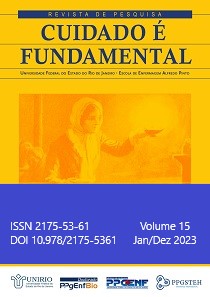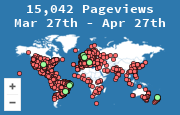‘Death Café’: percepciones de universitarios y profesores sobre la muerte y la finitud de la vida
DOI:
https://doi.org/10.9789/2175-5361.rpcfo.v15.12222Palabras clave:
MUERTE, CUIDADOS PALIATIVOS, ENSEÑANDO, UNIVERSIDAD, LOGOTERAPIAResumen
Objetivo: Este estudio tuvo como objetivo identificar las percepciones de estudiantes universitarios y profesores del área de la salud sobre la muerte y la finitud de la vida, después de participar en una actividad tipo “Café de la Muerte”. Método: Investigación descriptiva, con enfoque clínico-cualitativo, realizada con 17 estudiantes universitarios y 6 profesores en la que se utilizó como método de análisis de datos el análisis de contenido. Los resultados fueron discutidos desde el punto de vista de la logoterapia. Resultados: surgieron cuatro categorías: Calidad de vida y muerte, Muerte y trascendencia, Preferencias al final de la vida y Romper tabúes. Conclusión: hubo cambio en la comprensión de los participantes sobre el significado de la vida y la muerte al final de la actividad propuesta.
Descargas
Citas
Siqueira Perboni J, Zilli F, Oliveira SG. Profissionais de saúde e o processo de morte e morrer dos pacientes: uma revisão integrativa. Pers Bioet [Internet]. 2018 [cited 2022 nov 15] ;22(2):288–302. Disponível em: https://doi.org/10.5294/pebi.2018.22.2.7
Price DM, Strodtman LK, Montagnini M, Smith HM, Ghosh B. Health professionals perceived concerns and challenges in providing palliative and end-of-life care: a qualitative analysis. Am J Hosp Palliat Care. 2019 [cited 2021 dez 15] ;36(4):308–15. Available from: https://doi.org/10.1177/1049909118812193
Boucher NA, Dries E, Franzione A, Burton-Chase AM, Morris D, Sautter J. Developing the future end-of-life health care workforce: lessons learned from a survey of advanced health professions students. Am J Hosp Palliat Care. 2022[cited 2021 dez 15];39(6):613–8. Available from: https://doi.org/10.1177/10499091211035711
Castro MCF de, Fuly P dos SC, Santos MLSC dos, Chagas MC. Total pain and comfort theory: implications in the care to patients in oncology palliative care. Rev Gaúcha Enferm. 2021[cited 2022 10 ago];42:e20200311.Available from: https://doi.org/10.1590/1983-1447.2021.20200311
Kovács MJ. A caminho da morte com dignidade no século XXI. Revista Bioética. 2014 [cited 2022 set 15] Apr 1;22:94–104. Disponível em: https://www.scielo.br/j/bioet/a/QmChHDv9zRZ7CGwncn4SV9j/?lang=pt
Saioron I, Ramos FRS, Schneider DG, Silveira RS da, Silveira LR. Advance directives of will: nurses’ perceptions of benefits and new demands. Esc Anna Nery [Internet]. 28 de setembro de 2017 [cited 2021 13 dez];21(4). Disponível em: https://doi.org/10.1590/2177-9465-EAN-2017-0100
Academia Nacional de Cuidados Paliativos (ANCP). Análise situacional e recomendações para estruturação de programas de cuidados paliativos no Brasil,2018 [cited 2021 dez 15]. Disponível em: https://paliativo.org.br/wp-content/uploads/2018/12/ANALISE-SITUACIONAL_ANCP-18122018.pdf
Nelson KE, Wright R, Abshire M, Davidson PM. All Things Death and Dying: Health Professional Students Participating in the Death Café Model. Journal of Palliative Medicine 2018 [cited 2022 set 15] ;21:850–2. Available from: https://doi.org/10.1089/jpm.2017.0440.
Mitchell T, Nyatanga B, Lillyman S, Bruce M, Bryane S. Using Death Cafés as a method for discussing death and dying with third year student nurses. Int J Palliat Nurs .2021 [cited 2022 may 15] ;27(7):352–60. Available from: https://doi.org/10.12968/ijpn.2021.27.7.352
Frankl V E. Em busca de sentido (W. Schlupp, trad.). Petropolis: Vozes; 1985
Turato ER. Tratado da metodologia da pesquisa clinico-qualitativa. Petropolis: Vozes; 2003.
Death Cafe´: Holding Your Own Death Cafe´[Internet]. 2017 [cited 2021 15 dez]. Available from: http://deathcafe.com/how
Bardin L. Análise de conteúdo. Lisboa: Edições 70; 2016.
Malta R, Rodrigues B, Priolli DG. Paradigma na formação médica: atitudes e conhecimentos de acadêmicos sobre morte e cuidados paliativos. Rev bras educ med. 2018 [cited 2022 set 15] ;42(2):34–44. Available from: https://doi.org/10.1590/1981-52712015v42n2RB20170011
Roth AR, Canedo AR. Introduction to Hospice and Palliative Care. Primary Care: Clinics in Office Practice [Internet].2019 [cited 2021 dez 12];46(3):287–302. Available from: https://doi.org/10.1016/j.pop.2019.04.001
Valen K, Holm AL, Jensen KT, Grov EK. Nursing students’ perception on transferring experiences in palliative care simulation to practice. Nurse Education Today[Internet] 2019 [cited from 2022 set 10];77:53–8. Available from: https://doi.org/10.1016/j.nedt.2019.03.007.
Ferrell BR, Twaddle ML, Melnick A, Meier DE. National Consensus Project Clinical Practice Guidelines for Quality Palliative Care Guidelines, 4th Edition. Journal of Palliative Medicine. 2018 [cited 2022 set 13] ;21:1684–9. Available from: https://doi.org/10.1089/jpm.2018.0431.
Kokorelias KM, Gignac MAM, Naglie G, Cameron JI. Towards a universal model of family centered care: a scoping review. BMC Health Serv Res. 2019 [cited 2022 ago 13];19:564. Available from: https://doi.org/10.1186/s12913-019-4394-5.
Da Cruz Matos J, Da Silva Borges M. The family as a member of palliative care assistance. Revista de Enfermagem UFPE on line. 2018 [cited 2022 ago 15] Sep 8;12(9):2399. Disponível em: https://doi.org/10.5205/1981-8963-v12i9a234575p2399-2406-2018
Mercadante S, Gregoretti C, Cortegiani A. Palliative care in intensive care units: why, where, what, who, when, how. BMC Anesthesiol. 2018 [cited 2022 set 13] ;18:106. Available from: https://doi.org/10.1186/s12871-018-0574-9.
Wood J. Cicely Saunders, ‘Total Pain’ and emotional evidence at the end of life. Med Humanities. 2021 [cited 2021 dez 10] :medhum-2020-012107. Available from: https://doi.org/10.1136/medhum-2020-012107.
Cavalcanti FP. Ciências das Religiões no campo da espiritualidade e saúde. RET [Internet]. 2018 [cited 2022 set 15];32(3). Available from: https://facasc.emnuvens.com.br/ret/article/view/789
Roese A. A busca pelo espiritual e a busca de sentido no mundo contemporâneo (The search for the spiritual and the search for meaning in the contemporary world). HORIZONTE [Internet]. 2013 [cited 2022 nov 15] [;11(32):1605–36. Disponível em: http://periodicos.pucminas.br/index.php/horizonte/article/view/6026
Villani D, Sorgente A, Iannello P, Antonietti A. The Role of Spirituality and Religiosity in Subjective Well-Being of Individuals With Different Religious Status. Front Psycho. 2019 [cited 2022 nov 15];10:1525. Available from: https://doi.org/10.3389/fpsyg.2019.01525.
Sollgruber A, Bornemann-Cimenti H, Szilagyi I-S, Sandner-Kiesling A. Spirituality in pain medicine: A randomized experiment of pain perception, heart rate and religious spiritual well-being by using a single session meditation methodology. PLoS ONE [Internet] 2018 [cited 2022 out 10];13:e0203336. Available from: https://doi.org/10.1371/journal.pone.0203336.
Viftrup DT, Prinds C, Nissen RD, Steenfeldt VØ, Søndergaard J, Hvidt NC. Older Adults’ Experience of Meaning at the End of Life in Two Danish Hospices: A Qualitative Interview Study. Front Psychol 2021 [cited 2021 dez 15];12:700285. Available from: https://doi.org/10.3389/fpsyg.2021.700285.
Rietjens JAC, Sudore RL, Connolly M, van Delden JJ, Drickamer MA, Droger M, et al. Definition and recommendations for advance care planning: an international consensus supported by the European Association for Palliative Care. The Lancet Oncology [Internet]. 2017 [cited 2021 dez 15];18(9):e543–51. Available from: https://doi.org/10.1016/S1470-2045(17)30582-X
Howard M, Bernard C,Klein D, Elston D,Tan A, Slaven M, Barwich D, You JJ , Heyland DK. Barriers to and enablers of advance care planning with patients in primary care. Canadian Family Physician. April 2018[cited 2022 16 set], 64 (4) e190-e198. Available from: https://www.cfp.ca/content/64/4/e190.short
Conselho Federal de Medicina (CFM), Brasil. Resolução nº. 1.995, de 9 de Agosto de 2012. [Internet]. Diário Oficial da União: seção 1, Brasília, DF, p. 269-270, ago. 2012. Disponível em: https://sistemas.cfm.org.br/normas/visualizar/resolucoes/BR/2012/1995
di Luca A, del Rio A, Bosco M. Law on advance health care directives: a medical perspective. LA CLINICA TERAPEUTICA. 2018 [cited 2022 nov 22]:77–81. Available from: https://doi.org/10.7417/T.2018.2058.
Bonsignore A, Bragazzi NL, Basile C, Pelosi P, Gratarola A, Bonatti G, et al. Development and Validation of a Questionnaire investigating the Knowledge, Attitudes and Practices of Healthcare Workers in the Field of Anesthesiology concerning the Italian Law on Advance Healthcare Directives: a Pilot Study. Acta Biomedica Atenei Parmensis. 2021 [cited 2022 set 03];92:e2021092. Available from: https://doi.org/10.23750/abm.v92i4.11314.
Publicado
Versiones
- 2023-12-07 (4)
- 2023-12-04 (3)
- 2023-12-04 (2)
- 2023-11-30 (1)
Cómo citar
Número
Sección
Licencia
Derechos de autor 2023 Revista de Pesquisa Cuidado é Fundamental Online

Esta obra está bajo una licencia internacional Creative Commons Atribución-NoComercial-CompartirIgual 4.0.
TERMO DE TRANSFERÊNCIA DE DIREITOS AUTORAIS
Transfiro os direitos autorais deste artigo para a Revista de Pesquisa Cuidado é Fundamental - Online - RPCF, assim que ele for aceito para a devida publicação eletrônica. Os direitos de autor incluem o direito de reproduzir na íntegra ou em parte por qualquer meio, distribuir o referido artigo, incluindo figuras, fotografias, bem como as eventuais traduções. O autor pode ainda, imprimir e distribuir cópias do seu artigo, desde que mencione que os direitos pertencem a RPCF. Declaro que este manuscrito é original, não tendo sido submetido à publicação, na íntegra ou em partes para outros periódicos online ou não, assim cmmo em Anais de eventos científicos ou capítulos de livros.






























